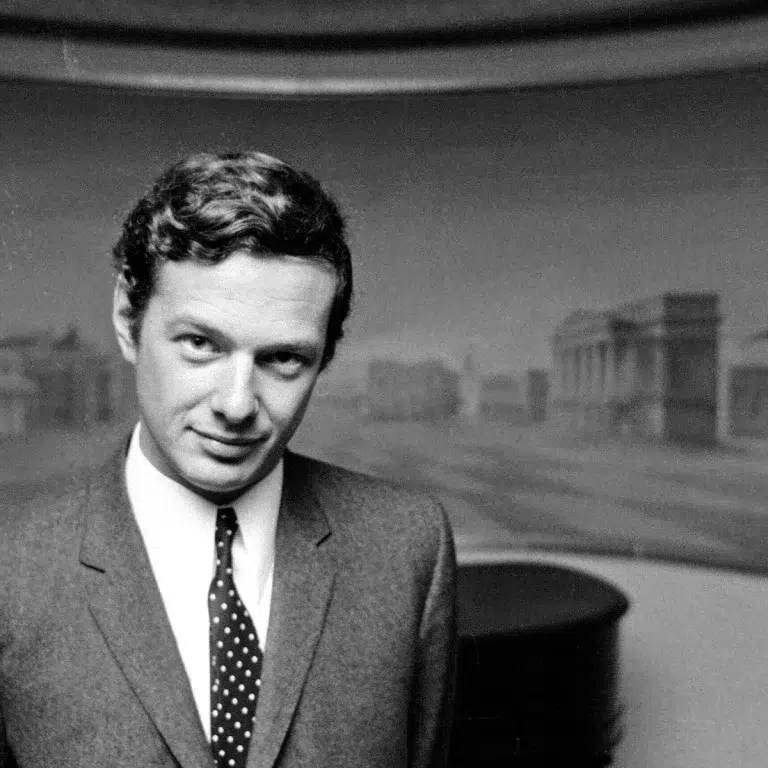
Sunday, August 27, 1967
Brian Epstein dies at 32
Last updated on May 1, 2024

Sunday, August 27, 1967
Last updated on May 1, 2024
Location: 24 Chapel Street, London, UK
Article Aug 25, 1967 • The Beatles travel to Bangor with Maharishi Mahesh Yogi
Article Aug 26, 1967 • The Beatles join a seminar with Maharishi Mahesh Yogi
Article Aug 27, 1967 • Brian Epstein dies at 32
Article Aug 27, 1967 • The Beatles leave Bangor and react to Brian Epstein's death
Interview Aug 27, 1967 • John Lennon, George Harrison and Ringo Starr react to Brian Epstein's death
Dec 18, 1966
Dec 08, 1980
Apr 17, 1998
Dec 05, 2023
On this day, Brian Epstein, the manager of The Beatles, was found dead in his residence on Chapel Street in London. Meanwhile, The Beatles themselves were away from the city, participating in a Transcendental Meditation initiation course led by Maharishi Mahesh Yogi in Bangor. Upon receiving the devastating news in the morning, they promptly cut short their retreat and swiftly made their way back to London.
From Wikipedia:
Epstein attended a traditional shiva in Liverpool after his father died, having just come out of the Priory clinic where he had been trying to cure his acute insomnia and addiction to amphetamines. A few days before his death he made his last visit to a Beatles recording session on 23 August 1967, at the Chappell Recording Studios on Maddox Street in Mayfair, London.
On 24 August, Epstein asked Peter Brown and Geoffrey Ellis down to Kingsley Hill for the bank holiday weekend. Approximately 50 miles from his home in Chapel Street, Kingsley Hill was Epstein’s country home in Warbleton, Sussex. After they arrived, Epstein decided to drive back to London alone because an expected group of friends he had invited failed to arrive, although they did turn up after Epstein left. Epstein phoned Brown at 5 p.m. the next day from his Chapel Street house in London. Brown thought that Epstein sounded “very groggy” and suggested he take a train back down to the nearest railway station, in Uckfield, instead of driving under the influence of Tuinal. Epstein replied that he would eat something, read his mail, and watch Juke Box Jury before phoning Brown to tell him which train to meet. He never called again.
Epstein died of an overdose of Carbrital, a hypnotic preparation combining the barbiturate pentobarbital with the bromoureide carbromal, in his locked bedroom on 27 August 1967. He was discovered after his butler had knocked on the door and then, hearing no response, asked the housekeeper to call the police. Epstein was found on a single bed, dressed in pyjamas, with various correspondence spread over a second single bed. At the statutory inquest his death was officially ruled an accident, caused by a gradual buildup of Carbrital combined with alcohol in his system. It was revealed that he had taken six Carbrital pills to sleep, which was probably normal for him, but in combination with alcohol they reduced his tolerance.
The Beatles were on a retreat in Bangor in northern Wales at the time, with the Indian guru Maharishi Mahesh Yogi. Epstein had previously agreed to travel to Bangor after the August Bank Holiday. The second of two shows by Jimi Hendrix at Epstein’s Saville Theatre was cancelled on the evening of Epstein’s death.
Peter Brown wrote in his memoir, The Love You Make: An Insider’s Story of the Beatles, that he had once found a suicide note written by Epstein and had spoken with him about it. According to Brown the note read in part, “This is all too much and I can’t take it any more.” Brown had also found a will in which Epstein left his house and money to his mother and his brother, with Brown also being named as a minor beneficiary. When confronted with the notes, Epstein told Brown that he would be grateful if Brown did not tell anyone, and that he was sorry he had made Brown worry. He explained that when he wrote the note and composed the will he had simply taken one pill too many, and that he had no intention of overdosing, promising to be more careful in the future. Brown later wrote that he wondered if he had done the right thing by not showing the note to Epstein’s doctor, Norman Cowan, who would have stopped prescribing drugs. The coroner, Gavin Thurston, told the Westminster inquest that Epstein’s death was caused by an overdose of Carbrital and ruled it as an accidental death. The pathologist, Dr Donald Teare, stated that Epstein had been taking bromide in the form of Carbrital for some time, and that the barbiturate level in Epstein’s blood was a “low fatal level”.
The Beatles did not attend Epstein’s funeral, both to allow his family some privacy and to avoid attracting fans and the media. According to Geoffrey Ellis, chief executive of NEMS Enterprises, the day before the funeral George Harrison had given Nat Weiss, Epstein’s good friend and confidant, a single flower (Ellis remembers it as a chrysanthemum) wrapped in a newspaper on behalf of all four Beatles, with instructions to place the flower on Brian’s coffin as a final farewell. However, flowers are forbidden at Jewish funerals and burials. Weiss and Ellis discussed this dilemma while walking back to the grave, where they observed two men beginning to shovel dirt onto the casket. Ellis later wrote: “Nat, who himself was Jewish, cast the newspaper package unopened onto Brian’s coffin, where it was swiftly covered by earth.” Epstein was buried in section A grave H12, in the Long Lane Jewish Cemetery, Aintree, Liverpool. The service at the graveside was held by Rabbi Dr Norman Solomon, who said, disparagingly, that Epstein was “a symbol of the malaise of our generation”. A few weeks later, on 17 October, all four Beatles attended a memorial service for Epstein at the New London Synagogue in St John’s Wood (near Abbey Road Studios), which was officiated by Rabbi Louis Jacobs. The Bee Gees’ 1968 song “In the Summer of His Years” was written and recorded as a tribute to Epstein.
I don’t think there was anything sinister in his death. There were rumours of very sinister circumstances, but I personally think it was a drink-and-sleeping-pills overdose.
Paul McCartney – From “The Beatles Anthology” book, 2000
I think what happened – and there’s no evidence whatsoever except people I talk to – was that Brian was going down to his house in the country. It was a Friday night, and there were going to be friends there. Brian was gay and I think there were going to be young men at the house. Brian went down with one of his friends, but no one had showed up – so he thought: ‘Ugh – it’s Friday night! I’ve got time to get back to London if I rush. Then I can get back to the clubs.’ It seems feasible to me, knowing Brian. Then he drove back up to London and went to the clubs, but they were all closing and there was not a lot of action.
So he had a few bevvies, then to console himself had a sleeping pill or two before to bed Brian always did that, he was quite into the pills. And then I think he woke up in the middle of the night and thought: My God, I can’t sleep. I haven’t had a pill.’ Then he had a few more pills, and I think that could have killed him.
I went round a couple of days later and saw Brian’s butler. He didn’t seem to feel there was anything suspicious, nor that Brian was in any kind of black mood. My feeling was that it was an accident.
Paul McCartney – From “The Beatles Anthology” book, 2000
George and John got a call from a medium who said that Brian was trying to contact us and that he had something to say to us. We didn’t want to pass up any channels, so John and George went along to the seance. But, they didn’t believe it at all. There was nothing in it.
Paul McCartney – From “The Beatles: Off the Record” by Keith Badman, 2008
In hindsight, the untimely demise of Brian Epstein marked a significant turning point often regarded as the beginning of the end for The Beatles. While the band had already embarked on their path of emancipation, exemplified by their decision to cease touring in 1966, they still held a deep respect for Brian and sought his guidance. With his sudden absence, they found themselves without the stabilizing influence he provided.
In the subsequent months, they were compelled to delve into the business aspects of their career and grappled with the realization that their creative works were not entirely their own. It was during this period that they established Apple, a venture born out of necessity. Within the band, the emergence of Paul McCartney as a prominent leader introduced a degree of frustration and tension within the band.
The business thing was out of necessity. We suddenly felt naked when it came to the business stuff. The last thing I wanted to be is a boss. The boss is a hated figure. But I suddenly felt I had to. So I told myself, ‘Just try and be a reasonable boss and not the stereotype.’ And I’ve tried to do that.
Paul McCartney – From an interview with Los Angeles Times, 2006
Brian would fetch in everything – ‘sign it, sign it’. We found out in the last year we’d signed our lives away and we tried to get ‘em back. And then suddenly he’d gone and there was this big responsibility and we really didn’t know how to handle it. Paul assumed leadership after Brian died. I keep saying it and he keeps denying it but I think that.
Ringo Starr – Circa 1969 – From “Northern Songs: The True Story of the Beatles Song Publishing Empire” by Rupert Perry, 2007
After Brian died we collapsed. Paul took over and supposedly led us. But what is leading us, when we went round in circles? We broke up then. That was the disintegration.
John Lennon – From “Northern Songs: The True Story of the Beatles Song Publishing Empire” by Rupert Perry, 2007
After Epstein died there was nobody to comfort them or tell them how to handle things so Paul thought he was personally responsible. I constantly saw Lennon & McCartney together because Paul came along to see that I wasn’t rude to John – who I can’t say I got on with. Paul didn’t want me to upset John and thought he could handle me better than Lennon which of course he could.
Sir Joseph Lockwood – EMI’s chairman – From “Northern Songs: The True Story of the Beatles Song Publishing Empire” by Rupert Perry, 2007
One of the major effects of Brian’s death was that The Beatles completely threw themselves into something new, which was Apple. Apple had started to be born, in fact, before Brian’s death. I think the boys flung themselves into it with the vigour that they did because Brian’s death was such an incredible blow. It took them a long time to realise that he wasn’t around any more, so we started really hard work on Apple, and creating this mythological thing.
Alistair Taylor – From “The Beatles: Off the Record” by Keith Badman, 2008
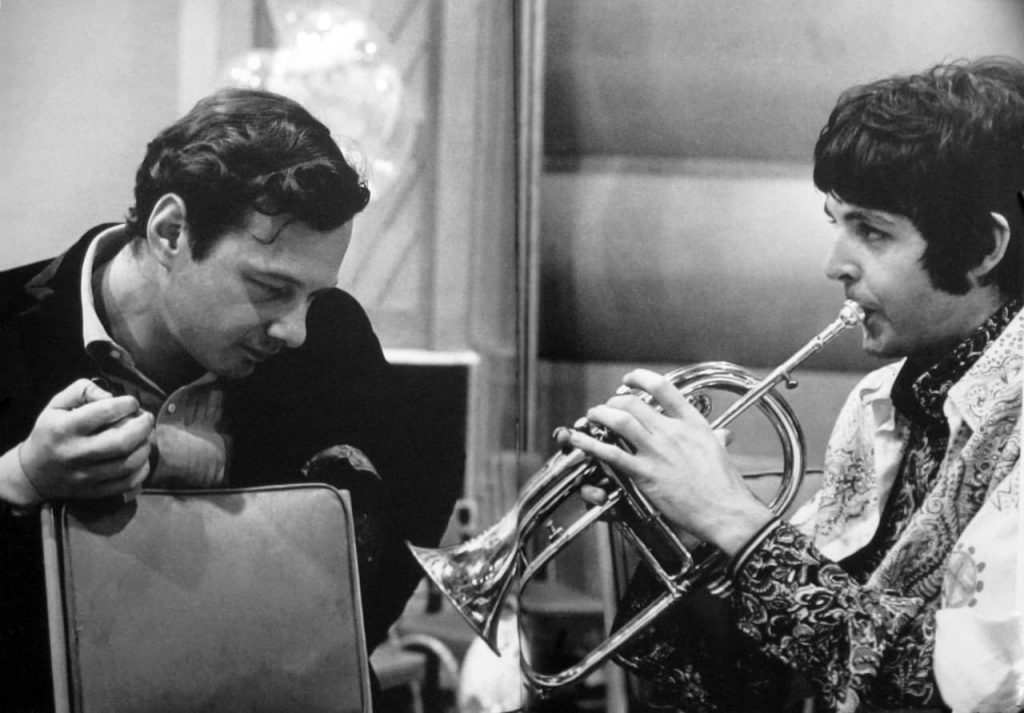
BRIAN EPSTEIN DEATH SHOCK
Brian Epstein, thirty-two-year-old manager of the Beatles and the man who launched the Liverpool group on the road to fame, was found dead yesterday afternoon by his house-keeper at his home in Chapel Street, Belgravia, London.
She became worried when she found his door locked and got no reply. She called others and the door was opened to find Liverpool-born Mr Epstein dead in his bed. Police were then called but foul play is not suspected.
A friend of Mr Epstein said: “He has been unwell for some months. The reason for his death is at present unknown, but there were no untoward circumstances associated with it.” One of two senior police officers who visited the house, said: “So far as we are concerned it is sudden death, and we cannot say any more than that.”
For the Beatles, who on Friday travelled to Bangor with the Himalayan mystic, Maharishi Mahesh Yogi, a day of mediation suddenly became a day of mourning. Within an hour of hearing the news, Paul McCartney left for London with girlfriend Jane Asher in a chauffeur-driven car and the other Beatles were expected to follow.
Epstein, born in Rodney Street, on September 19, 1934, went to Liverpool College and Wrekin College. With ambitions of becoming an actor, he went to the Royal Academy of Dramatic Art, but returned to Liverpool and began to sell records in his family’s stores, a chain of furniture and television shops in the north-west.
So many people asked for Beatles’ records that he traced the group to the Cavern Club and agreed on a management contract.
He once said that he managed them at a loss in the first year. One major recording company turned them down, saying they did not like the sound, but later, when the Beatles were earning as much as £8,000 a week, Epstein received 25 per cent of their earnings.
He emerged as the key figure in British pop music, with Liverpool’s CiIIa Black, Gerry and the Pacemakers, Billy J. Kramer and other leading names in the pop world, in his stable.
Three years ago he moved his headquarters from Liverpool to London and bought the £31,500 house in Belgravia.
He had package tours of artistes going out all over Britain, and master-minded the multi-million-pound Beatles merchandising campaign.
His business interests also included the theatre. He helped back several successful London shows, and two years ago acquired controling interest in the Saville Theatre, Shaftesbury Avenue.
Last night the 8.30 pop concert the Saville Theatre, headed by the Jimmy Hendrix Experience, was cancelled as a tribute to Mr Epstein. The six o’clock performance had already begun before the news reached the theatre.
Epstein’s father, Mr Harry Epstein, died just over a month ago. He was a warden of the Greenbank Drive synagogue, Liverpool, until last year.
In spite of his business success, Brian Epstein once said: “I’m not a commercial person, really. I’m still a frustrated actor.”
His own tastes in music inclined towards Bach and Sibelius.
Mr Tony Barrow, senior Press officer for NEMS Enterprises, said that on hearing of Mr Epstein’s death, the Billy J. Kramer group had decided to return to London from Middlesbrough. “I understand they have cancelled an engagement there,” said Mr Barrow. He added that Cilla Black was in Portugal.
He was one of us says Lennon
“You can’t pay a tribute in words to Brian. There is no such thing as death, only death in the physical sense. Life goes on,” said Beatle George Harrison in Bangor last night.
Ringo Starr said: “I have only had a few deaths of close friends and relatives, but I have been stronger this time. He was always generous to us. He dedicated so much of his life to The Beatles.”
John Lennon said: “We loved him, we liked him. He was just one of us.”
They said Epstein was due to arrive at Bangor today, also to be initiated as a member of the International Meditation Society. Immediately they heard of the death they went to see the Maharishi, who told them to have pleasant thoughts of Epstein because those thoughts would reach him wherever he might be.
The three Beatles were calm at the Press conference held as they were awaiting their cars to take them back to London.
Said Paul McCartney, with one arm around Miss Asher’s shoulders: “It is a great shock and I am very upset. We are going back to London.”
From Liverpool Daily Post – August 28, 1967
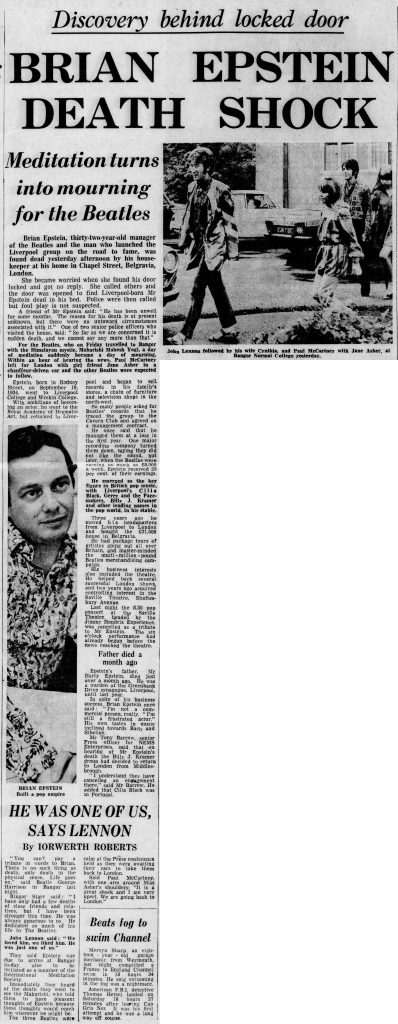
EPSTEN – Millionaire who feared loneliness
BRIAN EPSTEIN is dead and world show business has lost its most spectacularly successful manager.
In his short but fantastic career he guided the Beatles, Cilla Black, Gerry and the Pacemakers, Billy J. Kramer and others to the pinnacles of pop success. He had his failures too along the way, but they were overshadowed by the stupendous conquests of John, Paul, George and Ringo.
Epstein’s career as a manager, paralelled theirs as entertainers. Before that he’d become bored with acting, window dressing, selling furniture, records and books. People often asked — did he make the Beatles or did they make him? And Epstein himself was always the first to say the Beatles would have been as big without him. But his strongpoint was his deep belief in their fabulous future when they were still unknown.
He told the world they would outstrip the great Elvis Presley and was laughed at. He was right. But, characteristically, he didn’t have the last laugh. He was too polite for that.
Last month, the Melody Maker ran a remarkable series of interviews with Brian Epstein. They were arranged and written in Knokke, Belgium, where Epstein’s team of singers from his NEMS Enterprises had just won the European Song Contest. With candour and complete honesty he talked to the MM on three lengthy sessions.
On his possible addiction to LSD and marijuana, both of which he’d admitted sampling, he commented: “I took that risk. It was a calculated risk.”
On his own failings he said: “I reproach myself most often for being bad tempered and for being mean from time to time.” On failings in others he said: “I think I have overcome a very large ego so I’m very forgiving and tolerant of egomaniacs.” When asked if the Beatles would have been so successful if managed by someone else he replied: “They may have been as successful, but I don’t think they would have been as happy.”
Asked to comment on suggestions that he’d used the Beatles to promote other artists he replied: “This is absolutely untrue. I have always been perfectly single-minded about this and I must say in fairness that the Beatles have been easy to manage.” On the possibllity of him marrying being remote he said: “It is one of the biggest disappointments to me because I must be missing out somewhere not having a wife and children,”
Asked if he’d ever contemplated suicide:“Yes. But I think I’ve got over that period now.”
On the thing he feared most in life: “Loneliness. I hope I’ll never be lonely. Although, actually, one inflicts loneliness on oneself to a certain extent.”
The Epstein Interviews, as the serles was called, were written by the MM’s Mike Hennessey. He knew Epstein over a long period.
This week he commented:
It may seem lunatic to talk of failure in connection with a millionaire. Yet the impression I formed of Brian Epstein was of a man desperately wanting to be Creative, to express himself artistically, but knowing in his heart that he was destined for second hand fame — the reflected glory of the Beatles for whom his devotion and admiration were absolute. He wanted so much to be known as the fifth Beatle but I’m sure he was only too aware that he could not match their wit, their creative genius, their inexhaustible inventiveness. « The Beatles,” he said to me revealingly in our last interview, “always make an effort to involve me in what they’re doing.” This significant remark is made more poignant by his further admission that his greatest fear was loneliness. Brian Epstein, a basically kind, sometimes petulant, always scrupulously honest man, had come to terms with the fact that the Beatles could have suceeded without him. And, although he had no inctination to put it to the test, he must also have wondered “Could I Succeed without them?”
From Melody Maker – September 2, 1967

How will the Epstein tragedy affect the Beatles future?
THE meteoric pop career of Brian Epstein, which began when he heard the Beatles in Liverpool’s Cavern Club in November, 1961, ended on Sunday, August 27, 1967, with his tragically sudden death. In six years he is believed to have made a million pounds and built the most powerful pop empire io the world. What will now happen to that EmPire?
CONTRACT
At press—time the answer had still to be given. Future control of NEMS Enterprises may lie with any one of Epstein’s fellow directors, who include his joint managing director, Robert Stigwood; Vic Lewis, the bandleader-turned-impressario; David Shaw; and Brian’s younger brother Clive Epstein.
If no will is found, Epstein’s shares in NEMS, believed to be about 70 per cent, will go to his recently widowed mother, Mrs Queenie Epstein.
One thing is certain — the Beatles themselves will have a big say in their own future management, one possibility which cannot be ruled out is that they could manage themselves for a time. Their contract with NEMS is in any case due for renewal in October.
MEETING
Tony Barrow, NEMS Press Officer, told the MM: “The Beatles are too numbed by Brian’s death to make any plans at the moment, and until there has been a full board meeting, nothing can be finalised.”
John, Paul, George and Ringo will not be at the funeral of the 32-year-old Fifth Beatle; nor will any other stars, at the request of his relatives who want a private family-only ceremony in Liverpool.
His death has left his friends and associates stunned. Cilla Black flew home from holiday in Portugal immediately she heard the news.
TRAGIC
She told the MM: “The news of Brian’s death is so awful that I scarcely know what to say. That any great man, so young and so talented, should Jose his life is tragic. But it means more when the man is someone so close. He was a close friend and adviser who has guided every step of my career. […]
From Melody Maker – September 2, 1967
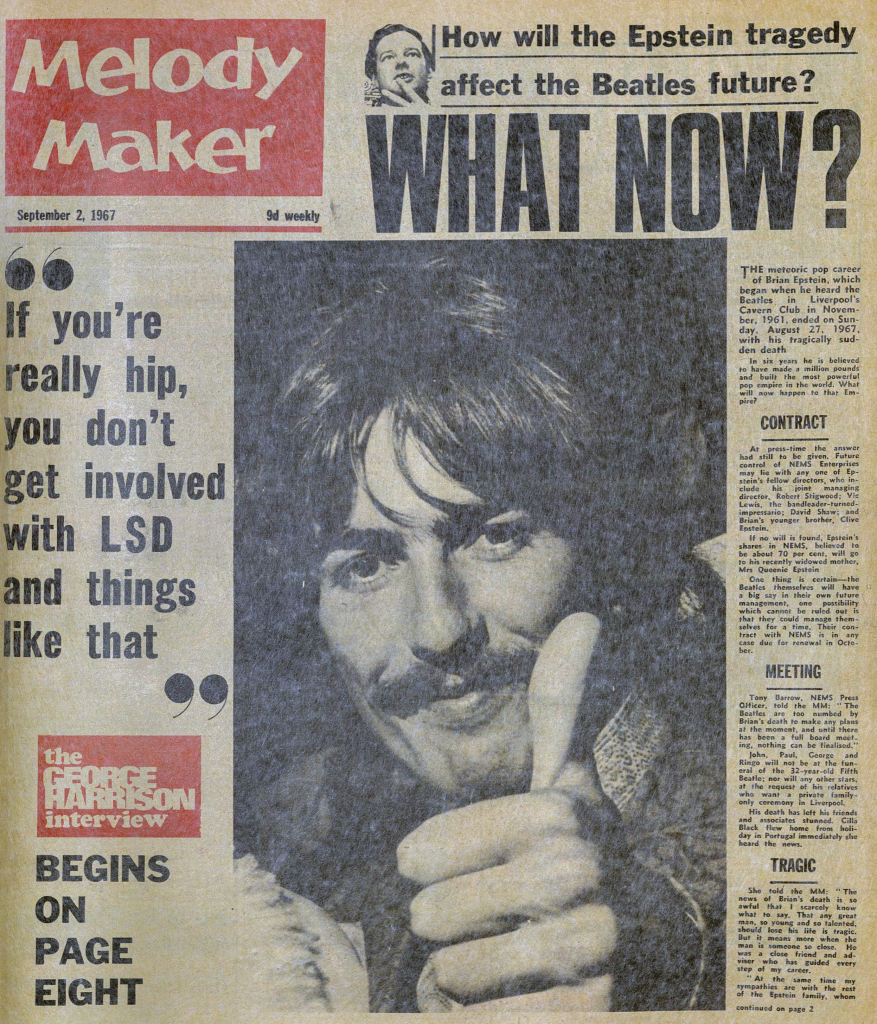
Tributes to the man who revolutionised British pop by giving the world the Beatles… BRIAN EPSTEIN
HE was 26 when he was asked for a record called “My Bonnie” by the Beatles by a Liverpool teenager. He was running the record department of his father’s store. He hadn’t the record, but he thought he’d have a look at the group. He saw a future in their happy, energetic sound — AND HE DID SOMETHING ABOUT IT. He gave it to the world and became world famous himself as the man who managed the Beatles — Brian Epstein.
Right up until his untimely, sad death at the age of 32, he was planning new enterprises for his Beatles and other artists, like Cilla Black. His great strength was his faith in their entertaining ability and the way he guarded this by never selling it cheaply.
In the beginning he spent money promoting the Beatles when they were almost unknown. He toured London with their tapes. Record companies turned them down. EMI put George Martin on to the Beatles. George was with Parlophone, till then a label concerned with comedy records. But the Beatles changed all that.
Brian Epstein had several tempting offers to sell his contract with the Beatles. But the Beatles didn’t want him to, so he didn’t want to either. As one of the Beatles said on hearing of his death: “He was one of us.”
The fifth Beatle did more for British show business than any manager, agent or impresario has ever done — he tore down “closed shop” signs in America and allowed many, many recording stars to win fame there and, in consequence, all over the world. Show business owes a great deal to Brian Epstein.
Elvis: Deepest condolences on loss of a good friend to you and all of us.
Cilla: The news is so awful I scarcely know what to say. He was so much more than a manager to me. He was a close friend and adviser.
Gerry: There will never be another manager like Brian. When I heard the news I was completely shattered. I knew Brian about ten years and he was my manager for five.
John: I can’t find words to pay tribute to him. It is just that he was lovable and it is those lovable things we think about now.
Paul: This is a great shock. I am terribly upset.
George: He dedicated so much of his life to the Beatles. We liked and loved him. He was one of us. There is no such thing as death. It is a comfort to us all to know that he is okay.
Ringo: We loved Brian. He was a generous man. We owe so much to him. We have come a long way with Brian along the same road.
From New Musical Express – September 2, 1967
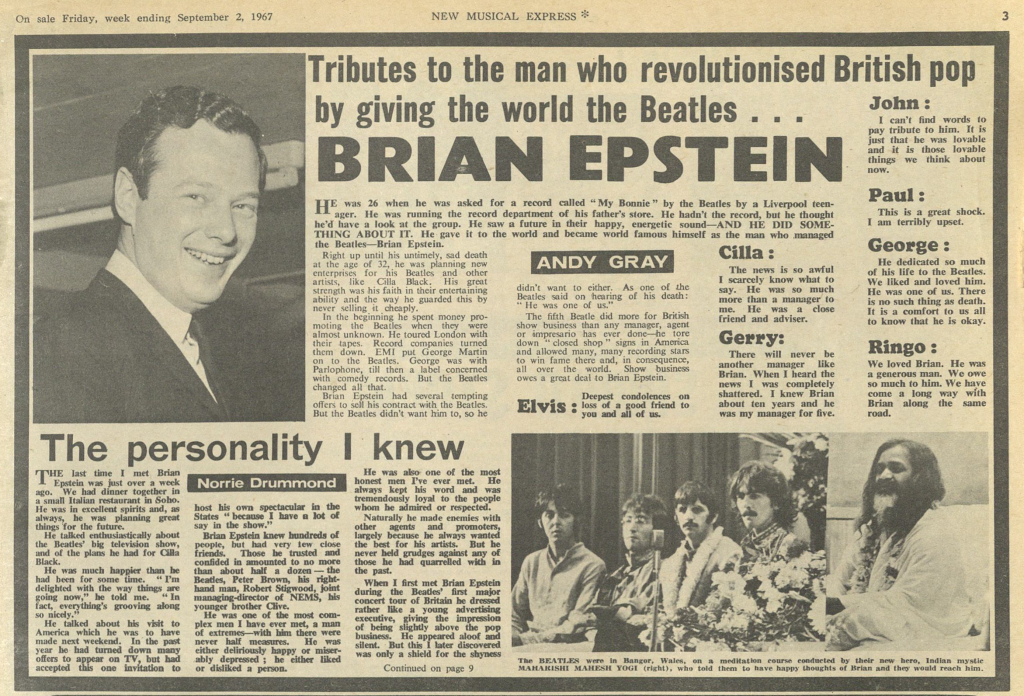
A TRIBUTE TO EPSTEIN
BRIAN EPSTEIN is dead, but the scene he created virtually single-handed lives on. The classical music lover who would have given anything to be a successful actor has departed with mind-numbing suddenness but the pop industry goes on… remembering.
We all have these memories. Our first one is of Brian bringing the Beatles, then gleaming with optimism and Northern frankness, into our office. We all sat and stared. And the Beatles stared right back. It was one ot their first interviews; we’d never even heard of them. Brian broke the ice with his customary charm. He spoke quietly. with the air of a man who doesn’t have to give the hard-sell, so great was his confidence in his wares.
He told us, within range of Beatle hearing, how he’d rather disliked the very sight of them when he first watched them work in the doomy confines of the Cavern Club in Liverpool. “They appeared rather unkempt”, he said, trying to hide a look of distaste.
Shuffle, shuffle went the Beatles feet. We looked closely at them. Well-scrubbed, neatly turned out. Brian had already stamped his authority on the millionaires-to-be. He talked on, most earnestly, but he wasn’t talking the language we usually heard from pop managers. None of the “These boys are greatest”. or “Look out Elvis – here they come”.
THE NEMPEROR OF POP
He’d already fought the long fight to get his “product” on record. It had called for persistence and determination and Briand had plenty of that.
We were left with the feeling that all we had to do was sit back and wait for the Beatles to “happen” but they took an ailing business by the scruff of the neck and refashioned it in their own group image. Exactly as Brian had planned…
Then he did the most difficult bit. He followed up with further successes. People said it couldn’t be twice, that luck played too big a part in the Beatle triumph. Well, Gerry and the Pacemakers notched three rwmber ones in a row. Cilla burst on the scene with all the freshness of an instant-star. Billy J. Kramer and the Dakotas kept up the run of talent from the North.
The titles were lavished on Brian, The Nemperor of Pops etc. Though a terribly shy man, he was forced into the position of giving interviews. He was, from a management point of view, THE voice of an industry which, for the first time, roared across the Atlantic and beat the Americans at their own game.
He thought of himself at the fifth Beatle… and was there to share all their triumphs. He worked through the night on his bookwork and his plans so that he could accompany any of his artists on any important show. His artists were his friends… All right, that’s been said a million times but it’s still very true.
Brian earned respect in a cut-throat business which was at first strange to him. He did it without cutting throats. He thust and parried and sometimes lost his temper but his aims were all for his stars. His family of entertainers, if you like. Hard on bargaining, but gentle on personal relationships.
Of course he had his failures. Nobody need bother to hide them at this sad time. Brian knew bis weaknesses and his strengths. He admitted them. Would not appreciate anyone else trying to avoid them.
LEGEND IN MANAGEMENT
Once there was only Colonel Tom Parker as the legend in pop management. Brian Epstein made it two. They’ve met and they’ve exchanged views… a summit meeting that fascinated the lesser big-men of the business.
It was October 1962 when the name Epstein started echoing round the business. That makes it five years. Just five years to build an empire the like of which had never been seen before. But an organisation with the human element never forgotten.
We’ve seen Brian signing autographs for young fans who clamoured round him with all the fervour saved for the top pop performers. He found this a trifle embarrassing – he wanted to be in the background but felt compelled to wander into the spotlight from time to time. He was young enough, you see, to be a part of the Beatle scene. He could identify with the fans who fought to see the four Liverpudlians he’s moulded into a sensational whole.
And now the whole group scene is his memorial. Everybody benefited from the atmosphere created by the Beatles. Given time, he could probably have settled the whole of the National Debt with his dollar-earning artistes.
Would it all have happened had Brian not wandered, self-consciously, into the Cavern Club that epoch-making afternoon? Well, there’s the theory that the Beatles had talent anyway and that talent will always out.
But we prefer to think that Brian Epstein speeded the whole thing up to sprint pace.
And we know, for sure, that he’ll be very sadly and deeply missed.
From Record Mirror – September 9, 1967
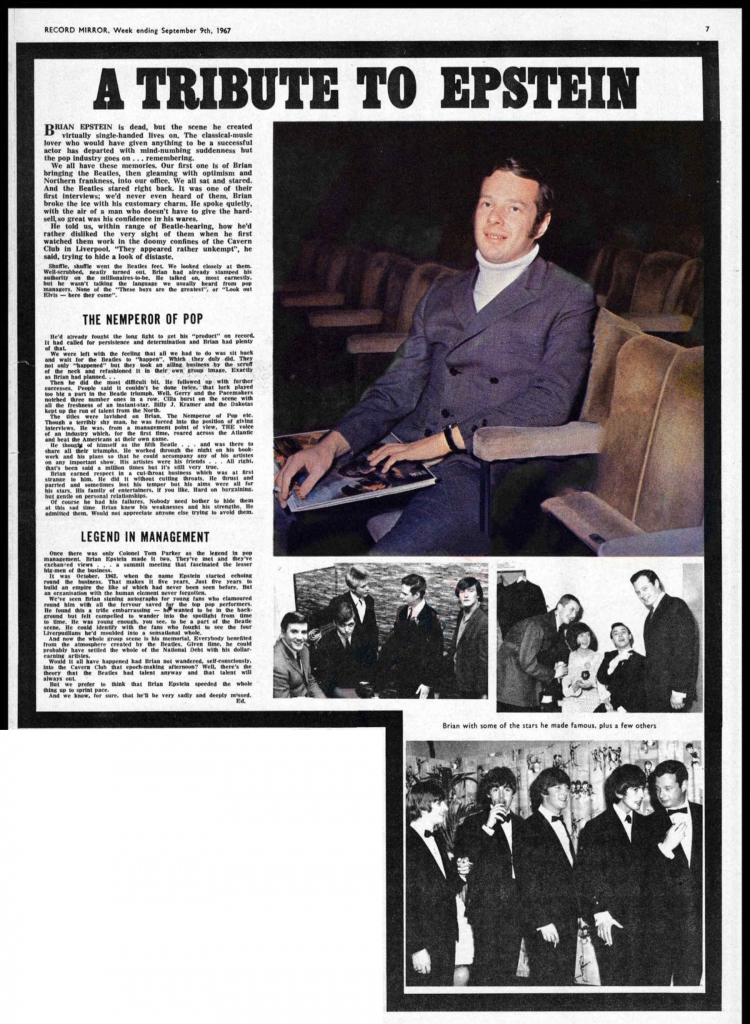
The Beatles Diary Volume 1: The Beatles Years
"With greatly expanded text, this is the most revealing and frank personal 30-year chronicle of the group ever written. Insider Barry Miles covers the Beatles story from childhood to the break-up of the group."
We owe a lot to Barry Miles for the creation of those pages, but you really have to buy this book to get all the details - a day to day chronology of what happened to the four Beatles during the Beatles years!
If we modestly consider the Paul McCartney Project to be the premier online resource for all things Paul McCartney, it is undeniable that The Beatles Bible stands as the definitive online site dedicated to the Beatles. While there is some overlap in content between the two sites, they differ significantly in their approach.

Notice any inaccuracies on this page? Have additional insights or ideas for new content? Or just want to share your thoughts? We value your feedback! Please use the form below to get in touch with us.